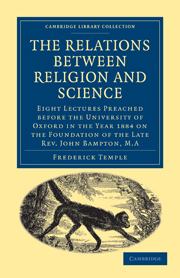 The Relations between Religion and Science
The Relations between Religion and Science Published online by Cambridge University Press: 29 August 2010
‘No man can say that Jesus is the Lord, but by the Holy Ghost.’
1 Cor. xii. 3.IT is now the proper time to review the arguinent of these Lectures, and to endeavour to trace, if possible, the source of the estrangement which just at present separates Eeligion and Science.
The postulate of Science is admitted on all hands to be the uniformity of nature, and the proof of this postulate has been found to consist in an induction from the facts which nature presents and our senses observe. Uniformity is quickly noticed, and after it has been noticed for some time it is instinctively used as a working hypothesis. So used it accumulates perpetually increasing evidence of its truth, and if we except two great classes of facts, we never find any instance of its failure. The two classes of facts which are thus excepted are the acts of the human will and the miraculous element in Revelation, both of them instances of one thing, namely, the interference of the moral with the physical. To complete the induction and to deprive the denial of universal uniformity of all evidence to rest on, all that is necessary is to get rid of these two exceptions. If Science could get rid of these exceptions, though it could not be said that the fundamental postulate was demonstrated, it could be said that all the evidence was in its favour and absolutely no evidence against it.
To save this book to your Kindle, first ensure [email protected] is added to your Approved Personal Document E-mail List under your Personal Document Settings on the Manage Your Content and Devices page of your Amazon account. Then enter the ‘name’ part of your Kindle email address below. Find out more about saving to your Kindle.
Note you can select to save to either the @free.kindle.com or @kindle.com variations. ‘@free.kindle.com’ emails are free but can only be saved to your device when it is connected to wi-fi. ‘@kindle.com’ emails can be delivered even when you are not connected to wi-fi, but note that service fees apply.
Find out more about the Kindle Personal Document Service.
To save content items to your account, please confirm that you agree to abide by our usage policies. If this is the first time you use this feature, you will be asked to authorise Cambridge Core to connect with your account. Find out more about saving content to Dropbox.
To save content items to your account, please confirm that you agree to abide by our usage policies. If this is the first time you use this feature, you will be asked to authorise Cambridge Core to connect with your account. Find out more about saving content to Google Drive.